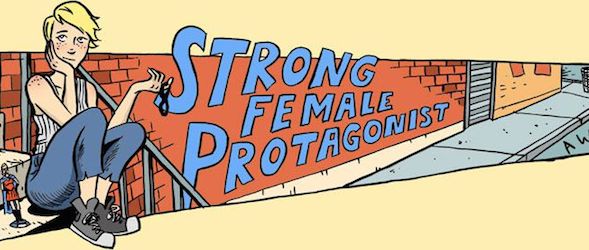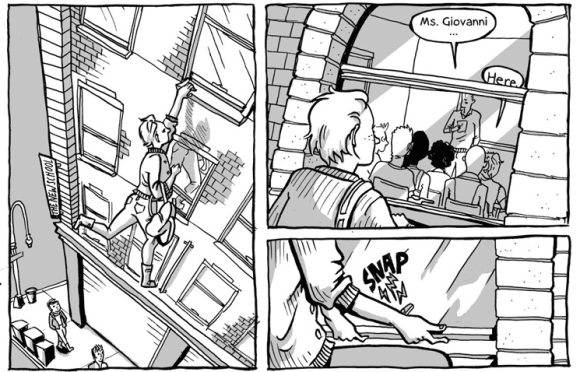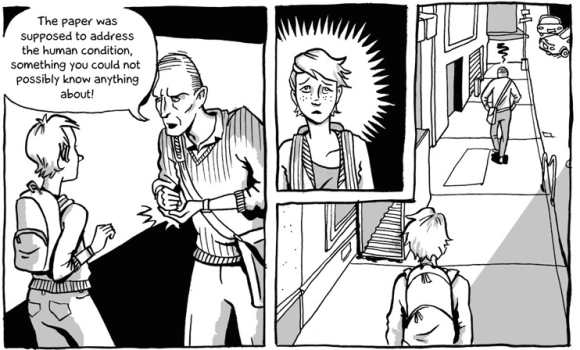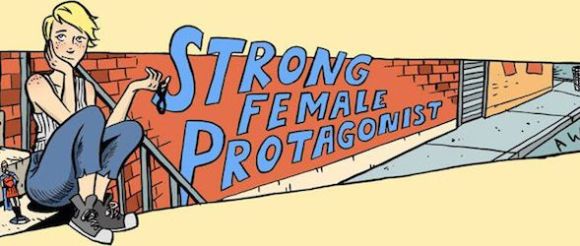The Mary Sue Interview: The Creators of Webcomic Strong Female Protagonist
Interview

Last week we came back from MoCCA bearing an interview with Fiona Staples, and this week we’re bringing you another, with Brennan Lee Mulligan and Molly Ostertag, writer and artist behind the webcomic Strong Female Protagonist. They tell us how their initial idea for SFP was to respond to the misuse of the “strong female protagonist” trope, but that that idea evolved very quickly into an inventive superhero story exploring many of the tropes of modern superhero universes… that just so happens to have a female protagonist.
The Mary Sue: I love Strong Female Protagonist‘s sort of indictment of superheroes — a loving kind of indictment of the superhero idea — and also that you decided to do that with a female protagonist instead of a male protagonist. Did one of those ideas come first or were they always sort of interconnected?
Brennan Lee Mulligan: I think what it started with — the original idea — was about the title. And about the problems that Molly and I both had with how that term gets used in discussions of media and storytelling, where a lot of characters are called strong female protagonists when it’s kind of a cipher, and it doesn’t mean what it should mean. Like, a female character will be called a strong female protagonist for crying only a handful of times as opposed to the entire story, when Indiana Jones is not called a strong male protagonist for bullwhipping Nazis and shooting guns at ghosts and stuff. So it started as an exercise in making a character strong in every sense of the word that we could find, where she’s strong in a literary sense — or so we hope — strong in the sense of conviction and heroism and morality, and then physically, superhumanly strong.
Molly Ostertag: And I think we also approached it from having a love of superheroes and the basic concepts of superheroes were really appealing to us, and so we kind of wanted to not like take on all of this baggage I think that a lot of the bigger companies that do superheroes have and just approach it from a different angle. But still try to have some of the fun and the excitement and just the metaphors that go along with having superpowers. That’s so really important to us.

TMS: What’s the last comic you bought (excluding ones by folks that you know).
Mulligan: Probably the last one was Hawkeye: My Life as a Weapon.
Ostertag: It’s really good
Mulligan: The last one I bought not knowing the creators. The thing is that superheroes — this is gonna get out there — superheroes are our mythology as Americans, they’re our cultural gods. I just saw a thing on the Instragram of some improviser friends of mine had a wall of hope — it was a 911 memorial — and it was drawn by kids, so kids drew things that made them hopeful after the 911 attacks. And one was a huge batman symbol, that a little kid drew. So it’s very meaningful and I think it is important to acknowledge that part of our cultural mythology. I don’t even like terms “deconstruction,” in terms of what we do, because everything we do is out of a love of superheroes.
Ostertag: We just wanted to approach it on a different angle. I recently bought Pretty Deadly, which I thought was incredible. [to Mulligan] You need to read it. I loved it because to me that’s a really good example comics that we need more of, where there’s a lot of women in it and it doesn’t make a big deal of it. There’s scenes where your realize there’s this crazy fight and all this intrigue and then you realize that it was all women and you never… it never felt schticky.
Mulligan: And actually that’s something about the substance of the comic as well is that we started with an idea of basing the original concept on the title, “Strong Female Protagonist,” and kind of using that as an exercise — “How do you make a character strong.” In terms of the substance of the plot of the comic — my mom is Elaine Lee, who wrote Starstruck and was one of the first woman who worked in comics, and is just, you know, coolest lady in the world. She’s here somewhere at the convention right now. What ended up happening was my mom, when I was a little boy and writing for the first time, was like “If you want to be subversive in terms of being a feminist, write stories about women where they’re grappling with human issues, and they’re being themselves, and finding their own identity.” And so a lot of the comic ended up just being explorations of what all good superhero stories are, which is about power, and responsibility and how you make a difference. So what’s interesting is the substance, the impulses for making the project, quickly morphed into the substance of the plot being very unrelated to the original idea of the comic. It’s about ethics and power and morality, not necessarily about examining “strong female protagonists.”

TMS: Last question, what female character do you want to see in a film or television adaptation?
Ostertag: Well, I want to see — I grew up on the Tamora Pierce young adult books, and there just needs to be a movie. [Hayao] Miyazaki could have done it, he didn’t, that’s okay, but there needs to be a movie of those. And also, more mainstream, I just want a Wonder Woman movie. I just want to see Wonder Woman punching people. Thats all I want. I want it to be exactly like a Captain America movie, but it’s Wonder Woman.
Mulligan: I’d love to see a Jean Grey movie, ’cause Wolverine got his own spinoff. I love Black Widow and I know there’s a huge movement for her to have her own movie because of The Avengers. But seeing a woman that actually has superpowers — I don’t have anything against Black Widow, I think she’s great — seeing someone that can do some supernatural stuff… Oh man, a Jean Grey led movie. She’s such an interesting character, and then you could have an awesome supporting cast of Storm and Rogue and everybody else. That would be my go to person for a film adaptation, certainly.
If you’d like to give Strong Female Protagonist a try, which I highly recommend, you can read it starting from page one right here! Mulligan and Ostertag are also planning their first SFC Kickstarter, so keep your eyes peeled for that!
Are you following The Mary Sue on Twitter, Facebook, Tumblr, Pinterest, & Google +?
Have a tip we should know? [email protected]
